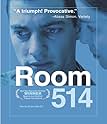No one has a big budget in the Israeli film industry, so it's natural to make virtue of necessity and film a story that takes place almost entirely in one little room. The story is a take on a theme we remember from THE CAINE MUTINY and more recently, as a previous commenter said, from A FEW GOOD MEN ("I have neither the time nor the inclination to explain myself to a man who rises and sleeps under the blanket of the very freedom that I provide, then questions the manner in which I provide it."). The heroine, who appears in every scene, undertakes a daunting investigation even though she is about to leave the service, and that's one of a few clichés that intrude. We seem to be watching the interrogations in real time-- that is, there are no cuts to indicate that minutes or hours have passed between bits of dialogue-- so there's an unrealistic rapidity to the way uncooperative witnesses become cooperative; but on a moment-to-moment basis the acting makes it more or less believable. On the other hand, there are some distracting cuts-- from one perspective to another perspective that's only slightly different or a little farther away-- that seem to have no dramatic justification, and it's hard to think of them as anything but splices that were technically necessary and couldn't be smoothed over by the editor. As I said, though, budgets in Israel are small; so maybe the editor didn't have a lot of time and resources available.




















